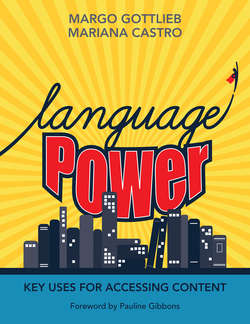Читать книгу Language Power - Margo Gottlieb - Страница 38
На сайте Литреса книга снята с продажи.
Argue
ОглавлениеWhether you are a student, teacher, or school leader, you probably have been asked to take a position, make a claim, and support it with specific evidence. These features are the ones most associated with the key use argue. In the context of school, arguments may be expressed in academic articles, persuasive speeches, convincing conversations, or even e-mails. Before you even respond to each of these scenarios, if you are to offer a rebuttal, you are most likely expected to (1) place yourself in the particular situation and recognize the audience, (2) evaluate text or the ongoing conversation, and (3) develop your position in relation to the situation.
Crafting arguments begins in kindergarten, when students indicate preferences and likes or dislikes, and continues through the end of high school, when students are expected to engage in sophisticated debates and create position papers and critiques. In school, we ask students to argue for the purpose of doing the following:
1 Supporting positions or points of view
2 Persuading others of particular courses of action
3 Showing someone the problems or difficulties with theories, approaches, or courses of action
To argue effectively, you need sophisticated language, but it pays off! Research has shown that learning to write arguments has positive impact on student learning. Students are able to build audience awareness, deepen understanding of content, better integrate ideas from multiple texts, and pay greater attention to information (Le Bigot & Rouet, 2007; Wiley & Voss, 1999). Typically, by middle school, students can identify and incorporate the following discourse and sentence features into oral or written arguments:
An appeal to logic
Facts, statistics, or specific examples as support for the claims
Evidence of a research base
Personal experiences to introduce or reinforce claims
Counterclaims tied to evidence
Use of linking phrases to build up a series of ideas
Employment of emphatic words or expressions
Repetition of key phrases
It is important for students to be aware of how the use of specific language shapes arguments so that they can intentionally choose language based on the purpose and the features of the key use. Inviting students to be decision makers means that they have choices as writers or speakers. For example, by having students determine whether to include the thesis statement at the beginning or at the end of the first paragraph, agency is shifted to them, along with the ownership of the tone and voice in the argument. DARE provides spaces for these conversations about how language works, which is often referred to as metalanguage. Metalanguage, or thinking and talking about language, encourages agency in students as it pushes students to think about the impact of their language choice on their message. In Figure 1.6, we provide examples of how features of language can be used for particular purposes in arguments.
